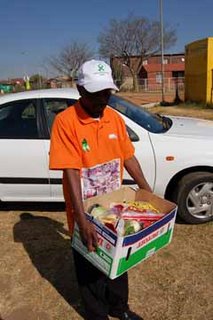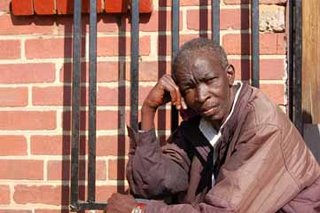One of the challenges of the global AIDS pandemic is the fact that it is so big, the suffering and death and poverty so vast, that it is mind-numbing. How do you put a human face on statistics that tell you things like:
- There were 4.9 million new HIV infections worldwide in 2004, according to UNAIDS. 3.1 million of these occurred in sub-Saharan Africa.
- During 2004, 3.1 million people died of AIDS -- 2.3 million of them in Africa.
- That same year, 2.2 million children worldwide were living with HIV. More than half a million perished.
Too mind-boggling, you can't wrap your heart around it. It simply doesn't hurt.
Well, there's a cure for that. Go and visit one person whose life has been devastated by HIV. After we left the Home-Based Caregivers group we told you about yesterday, we went with one of the caregivers, a softspoken young gentleman named Mandla. By the way, everyone you meet here always tells you not only their name, but what it means. I think that's kind of cool, that everyone lives constantly with the meaning of their name. "Mandla," we were told, means "strength." He proceeded to demonstrate, carrying a large box of vegetables and other food from the car toward the home of one of his patients, a 42-year-old woman named Sinnah.
After we left the Home-Based Caregivers group we told you about yesterday, we went with one of the caregivers, a softspoken young gentleman named Mandla. By the way, everyone you meet here always tells you not only their name, but what it means. I think that's kind of cool, that everyone lives constantly with the meaning of their name. "Mandla," we were told, means "strength." He proceeded to demonstrate, carrying a large box of vegetables and other food from the car toward the home of one of his patients, a 42-year-old woman named Sinnah. The red brick home looks comfortable and peaceful. A large yellow container, half the size of a railroad car, is located in one corner; we are told that's a set of portable telephone booths for the neighborhood's use. Apparently the family derives some income from renting the precious space. Outside the home, a gentleman sits and contemplates us silently. The lines etched into his face makes him seem incredibly sad.
The red brick home looks comfortable and peaceful. A large yellow container, half the size of a railroad car, is located in one corner; we are told that's a set of portable telephone booths for the neighborhood's use. Apparently the family derives some income from renting the precious space. Outside the home, a gentleman sits and contemplates us silently. The lines etched into his face makes him seem incredibly sad. Inside the home we meet his wife, Sinnahme, and her daughter, who lies pallidly beneath a large woolen blanket. Her gaunt face and tufts of scruffy black hair accentuate the size of her eyes and make them look both enormous and probing, though dull with pain. We try to gauge, by looking at the space occupied by her form beneath the blanket, her emaciated frame. I don't think she could have weighed more than 70 or 80 pounds.
Inside the home we meet his wife, Sinnahme, and her daughter, who lies pallidly beneath a large woolen blanket. Her gaunt face and tufts of scruffy black hair accentuate the size of her eyes and make them look both enormous and probing, though dull with pain. We try to gauge, by looking at the space occupied by her form beneath the blanket, her emaciated frame. I don't think she could have weighed more than 70 or 80 pounds.
Several of Sinnah’s children, ages 5 through 22, are in school as we visit. The sixth, a daughter -- born shortly after Sinnah’s discovery of her illness -- contracted the virus in utero and died two months after birth. Sinnah whispers her name sadly then explains, “It means: ‘Hidden.’”
Sinnah’s husband, too, succumbed to the disease last year. His name, Silloh, means “Moaning.”
The compassion shown to Sinnah by her mother is, sadly, not the norm in this society. Many parents ostracize their children after learning of their illness, sometimes forcing them to spend their days wasting away in one of the corrugated metal shacks which are so common in Soweto. The stigma of AIDS is a powerful enemy. While she is accepted by her mother, their friends and neighbors whisper and point. “It kills you,” Sinnahme says. Even Sinnah’s own brothers refuse to visit her in her sickbed.
But Mama Sinnahme explains, with a tear: “I’ve got four boys and this is the only girl, and she is a gift from God, so we must care for her.”
Mandla delivers his food and encourages Sinnah and her mother to prepare something that she can begin eating. Antiretroviral drugs (ARVs) have recently been made available to patients like Sinnah by the South African government, but she needs to eat before she can begin taking them. If she can eat and keep food down, then take her ARVs, her strength may return and her situation could improve dramatically. It happens all the time, the caregivers know. So they counsel, and encourage, and pray. And hope.
Tomorrow: We meet one man who is doing something to help. Something very simple.
Everyone can do something!

No comments:
Post a Comment